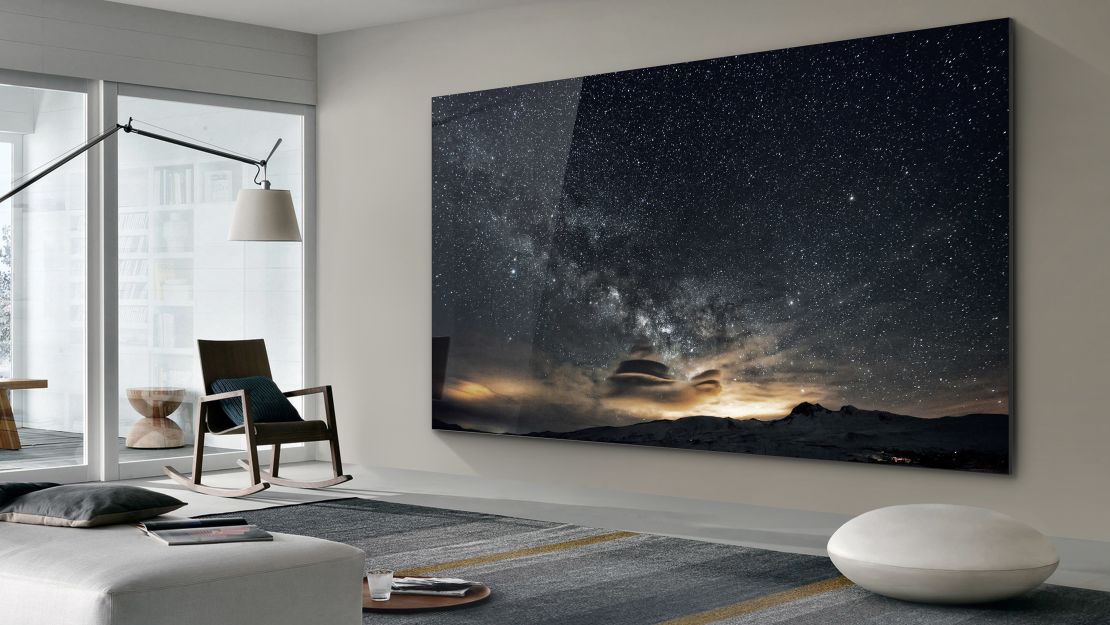Rolling, translucent, enormous, sharp and talkative.
New televisions are debuting this week in Las Vegas, and they all have a special trick or two.
TVs have been commercially available for 90 years. That’s a long time to stay fresh and innovative, but every January at the Consumer Electronics Show in Las Vegas, manufacturers try their hardest to make them exciting again.
This year, companies including LG, Samsung, and Sony showed off their latest prototypes at the annual consumer electronics show. Many of the products are years away from a spot in your living room unless you are a fabulously wealthy early-adopter, but they give a peek into what we’ll be binging on in the future.
LG is on a roll
Last year, LG Display – a research arm of LG Electronics – showed us its rolling TV prototype, which can be wound up like a yoga mat into a box when not in use. Now its partner brand LG has made a real version of the rollable set that will be available to consumers. The 65-inch “Signature Series” OLED television will be available in the second half of the year, according to LG. There’s no price yet for the device.
LG Display is working on more prototypes and innovations, and showed CNN a number of new products. The massive 88-inch 8K OLED television isn’t just large AND with more pixels than anyone currently needs. Instead of relying on attached speakers, the TV’s sound system is embedded in the screen, making it so that noises seem to come directly from the objects making them.
Other LG Display prototypes include portable desktop monitors that can be moved around easily, and a transparent OLED screen that could help a window double as a TV or a surface for ads. The 8K technology is the next big bump in screen resolution for televisions, but is still a couple years away from being mainstream as there’s not much 8K content available.
Everyone is working with Apple
Samsung made a splash on Sunday when it announced it was adding an iTunes app to its smart TVs. It is also adding support for HomeKit and AirPlay 2, which lets you play content from Apple devices on the bigger screen, including music, photos and movies. On Monday, Vizio and LG announced they were also adding support for AirPlay and HomeKit. Apple has traditionally been closed off when it comes to giving outside hardware companies access to its ecosystem, but it may recognize it as the key to growing its increasingly important services business, which includes apps, movies, TV shows and music.
The TVs will keep getting bigger forever
What’s more impressive than an 88-inch TV? A 219-inch TV! Samsung showed a larger version of the “The Wall,” the massive MicroLED display it announced at CES last year. The new MicroLED technology is exciting, even if you can’t afford a floor-to-ceiling TV. The screen creates a brighter image that uses up less energy, and could be an alternative to current screen technology in the future.
The company also announced new 75-inch modular MicroLED screens that can be cobbled together to build a 270-inch display. Modular displays take smaller screens of various shapes and sizes, and click them together into larger custom designs, like blocks. The company did not say when it would sell the modular displays or The Wall, or how much they would cost.

Sony also went big, announcing 85 and 98-inch versions of its 8K television. TCL is making a 75-inch version of its Roku TV, and Hisense showed off its 4K laser projector that works with a 100 or 120-inch screen.
Remotes are old school
Voice control continued to be the popular addition for all the TV companies, as they also added more support for popular voice assistants like Google Assistant and Amazon’s Alexa. Vizio is including the ability to control its TVs with Google Assistant or Alexa. LG already offered Alexa integration on its TVs, and last week it announced they would also support Google Assistant.
Even though Samsung has its own lesser-known assistant, Bixby, the company is also adding support for Alexa and Google Assistant on its TVs coming out in 2019, but it will need an actual Google or Echo device to work.





















